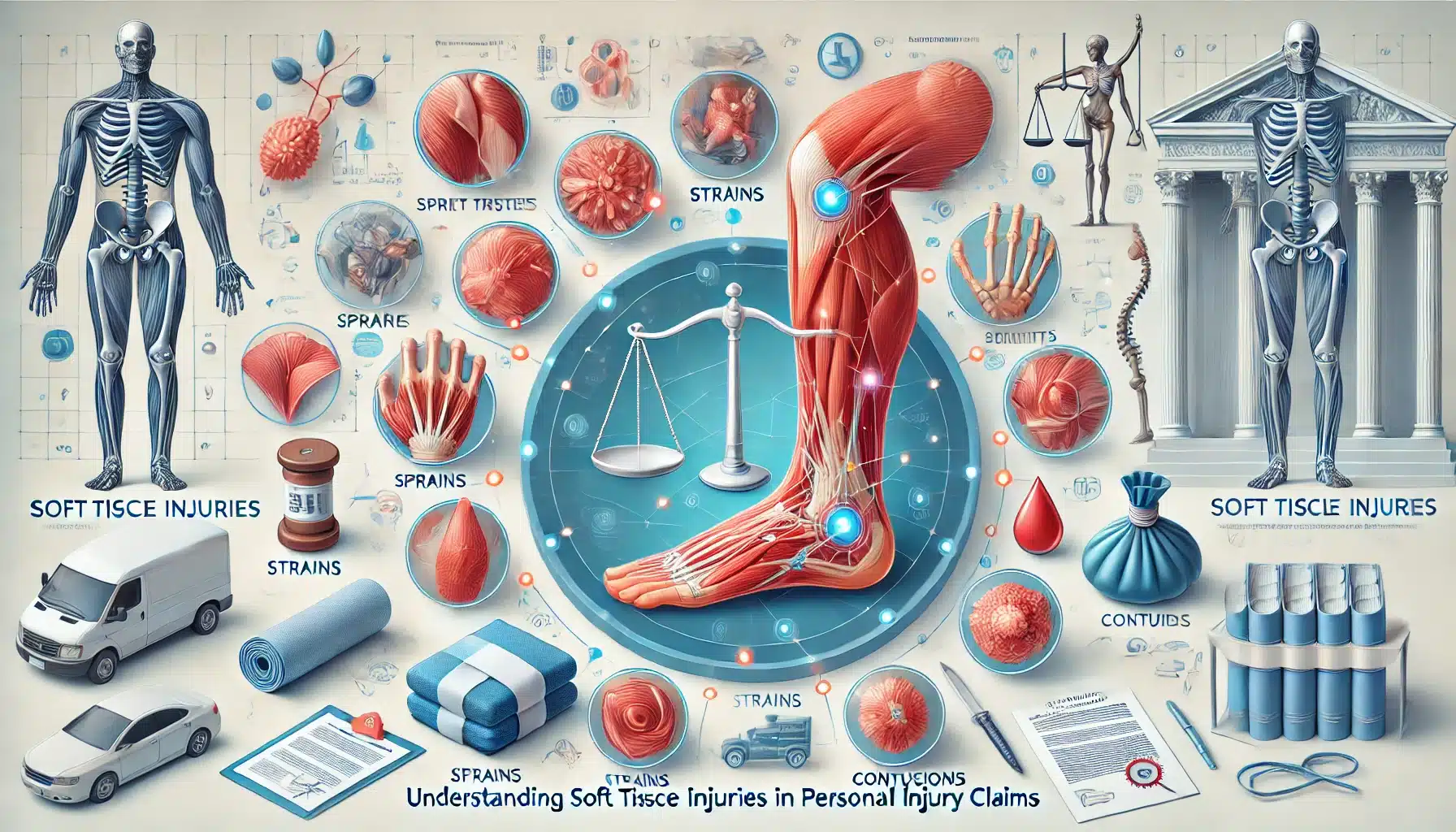on this page
Key facts
- Soft tissue injuries damage muscles, tendons, ligaments, or fascia, causing pain and swelling.
- They commonly result from trauma, overuse, improper technique, fatigue, or hazardous conditions.
- Symptoms include pain, swelling, bruising, tenderness, and limited mobility.
- Treatment typically involves the RICE method, pain management, physical therapy, and sometimes surgery.
What is a soft tissue injury?
A soft tissue injury involves damage to muscles, tendons, ligaments, and fascia, leading to pain and swelling.
Key aspects
- Types: Includes sprains, strains, contusions, and tendonitis.
- Causes: Result from trauma, overuse, or improper techniques.
- Symptoms: Pain, swelling, bruising, and limited movement.
- Diagnosis: Typically involves a physical exam and may include imaging tests like ultrasound or MRI.
- Treatment: Often includes rest, ice, compression, elevation (RICE), physical therapy, and possibly surgery.
Understanding soft tissue injuries is vital for effective recovery.
What are the symptoms of soft tissue injuries?
Symptoms of soft tissue injuries can vary based on the type and severity of the injury but commonly include:
- Pain: Localized pain at the injury site, which may worsen with movement.
- Swelling: Noticeable swelling around the affected area due to inflammation.
- Bruising: Discoloration indicating bleeding beneath the skin.
- Tenderness: Sensitivity to touch in the injured area.
- Limited Mobility: Reduced range of motion or difficulty using the affected limb.
- Stiffness: Tightness or rigidity in the muscles or joints surrounding the injury.
- Crepitus: A crackling or popping sensation during movement in some cases.
Recognizing these symptoms is crucial for prompt diagnosis and effective treatment.
What causes soft tissue injuries?
Soft tissue injuries can result from:
- Acute Trauma: Sudden injuries from falls or collisions.
- Overuse: Repetitive motions leading to strain.
- Improper Technique: Incorrect form during physical activities.
- Fatigue: Weak muscles increase injury risk.
- Environmental Factors: Hazardous conditions, like slippery surfaces.
Recognizing these causes helps in preventing soft tissue injuries.
How are soft tissue injuries diagnosed?
Diagnosing soft tissue injuries involves several steps to assess the extent and nature of the damage.
Diagnostic steps
- Medical History: Review of symptoms, injury details, and any relevant medical background.
- Physical Examination: Assessment of pain, swelling, bruising, and range of motion in the affected area.
- Imaging Tests:
- Ultrasound: Used to evaluate soft tissue damage and fluid accumulation.
- MRI: Provides detailed images of soft tissues, useful for identifying tears and other injuries.
- X-rays: May be conducted to rule out fractures or bone injuries.
- Functional Tests: Assessing strength and mobility to determine the impact of the injury.
These diagnostic methods help healthcare professionals confirm soft tissue injuries and guide treatment decisions.
What are the complications of soft tissue injuries?
Soft tissue injuries can lead to several complications that may affect recovery and overall function. Key complications include:
- Chronic Pain: Persistent pain can occur even after initial healing, impacting quality of life.
- Reduced Mobility: Limited movement may develop due to stiffness or weakness in the affected area.
- Re-Injury: Inadequate healing or premature return to activity can increase the risk of re-injury.
- Scar Tissue Formation: Excessive scarring may restrict movement and flexibility.
- Infection: Open wounds or severe injuries can become infected, leading to further complications.
- Compartment Syndrome: Increased pressure within muscle compartments can cause serious damage to muscles and nerves.
Recognizing these complications is essential for timely intervention and effective management.
How can you prevent soft tissue injuries?
Preventing soft tissue injuries involves several key strategies:
- Warm Up: Perform dynamic stretches before activities to prepare muscles.
- Use Proper Techniques: Maintain correct form during exercises and sports.
- Strengthen Muscles: Engage in strength training to enhance resilience.
- Cross-Train: Vary workouts to avoid repetitive strain.
- Listen to Your Body: Rest if you experience pain or discomfort.
- Wear Appropriate Gear: Use suitable footwear and protective equipment.
- Stay Hydrated: Drink enough water to support muscle function.
These measures can significantly reduce the risk of soft tissue injuries.
How are soft tissue injuries treated?
Treating soft tissue injuries focuses on relieving pain, reducing inflammation, and promoting healing.
Treatment options
- RICE Method: Rest, Ice, Compression, and Elevation to minimize swelling and pain.
- Pain Management: Use over-the-counter pain relievers like ibuprofen or acetaminophen.
- Physical Therapy: Engage in targeted exercises to restore strength and flexibility.
- Manual Therapy: Techniques like massage or mobilization to improve circulation and reduce tension.
- Brace or Support: Use splints or wraps to stabilize the injured area during recovery.
- Injections: Corticosteroid injections may be considered for reducing severe inflammation.
- Surgery: In cases of severe tears or damage, surgical intervention may be necessary.
Effective treatment can enhance recovery and restore function to the affected area.
Resources and support
Accessing the right resources is crucial for recovery from soft tissue injuries.
Key resources
- Medical Professionals: Consult doctors and therapists for diagnosis and treatment.
- Support Groups: Join communities for emotional support and shared experiences.
- Rehabilitation Services: Engage in physical therapy to regain strength and mobility.
- Educational Materials: Use information from reputable organizations on injury management.
- Pain Management Clinics: Seek specialized care for effective pain relief.
- Nutritional Guidance: Consult dietitians to support recovery.
- Mental Health Services: Consider counseling for emotional challenges.
These resources enhance recovery and overall well-being.












